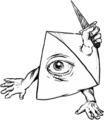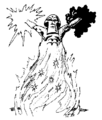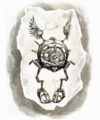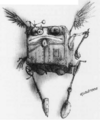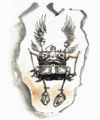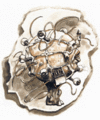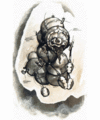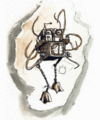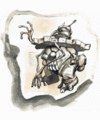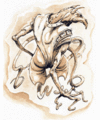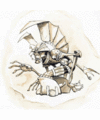Modron: Difference between revisions
1d4chan>Nubnuber |
1d4chan>Nubnuber |
||
| Line 96: | Line 96: | ||
== Gallery == | == Gallery == | ||
<gallery> | <gallery> | ||
Modron-monodrone-MM2 page87.jpg|From Monster Manual II | |||
Duodrone 1e.png | |||
Tridrone 1e.png | |||
Quadrone 1e.png | |||
Pentadrone 1e.png | |||
Monodrones march by Adam Rex.jpg|[[/r9k/]]? Try /r(9*10^9)k/ | |||
Decaton overseer.jpg|Middle-management has its perks. Like five extra eyes, and luscious lips. | |||
Modron_simple.png|Early concept art? | |||
Primus 1e.png|1e Primus | |||
Primus from blood-wars game.jpg|Primus, as he appeared in the [[Blood War]]s [[card game]]. | |||
Primus 2e.jpg|Primus and Tenebrous, from ''The Great Modron March''. | |||
2e_Monodrone.gif| A monodrone, as they appeared in 2e | |||
Duodrone 2e.jpg|A duodrone, as they appeared in 2e | |||
Tridrone 2e.jpg|A tridrone, as they appeared in 2e | |||
2e_Quadrone.gif|A quadrone, as they appeared in 2e | |||
2e_Quadrone_2.gif|Another 2e quadrone | |||
Quadrone 4e.jpg|A 4e quadrone | |||
Pentadrone 2e.jpg|A pentadrone, as they appeared in 2e | |||
Pentadrone PoL.jpg|Another 2e pentadrone | |||
2e_Decaton.gif|A decaton, as they appeared in 2e | |||
Decaton PoL mechanus.jpg|A decaton from ''Planes of Law'' | Decaton PoL mechanus.jpg|A decaton from ''Planes of Law'' | ||
2e_Nonaton.gif|A nonaton, as they appeared in 2e | |||
2e_Octon.gif|An octon, as they appeared in 2e | |||
2e_Septon.gif|A septon, as they appeared in 2e | |||
2e_Hexton.gif|A hexon, as they appeared in 2e | |||
2e_Quinton.gif|A quinton, as they appeared in 2e | |||
Quarton.PNG|A quarton, as they appeared in 2e | |||
Secundus PoL.jpg|A secundus | |||
</gallery> | </gallery> | ||
{{D&D2e-Races}} | {{D&D2e-Races}} | ||
{{D&D-Outsiders}} | {{D&D-Outsiders}} | ||
Revision as of 15:54, 1 January 2021

Modrons are a race of Lawful Neutral Outsiders introduced into Dungeons & Dragons in 1st edition (MM2, pg 86), native to the plane of Nirvana, AKA Mechanus. In AD&D 2nd edition, thanks to the Planescape setting, they were the primary inhabitants of the extreme lawful-neutral plane of Mechanus. In D&D 3rd edition's Manual of the Planes, they share Mechanus with the Formians (giant ant-people) when their lawful good / lawful neutral plane went too lawful (thanks a lot, Harmonium!) and was annexed by Mechanus.
Modrons first appeared as living geometric shapes - spheres, cubes, pyramids, etcetera. In 2nd edition, to try and make them look less goofy, they were redesigned with a more clockwork cyborg motif. They are perhaps one of the most iconic races invented for Planescape.
Modrons divide their territory in Mechanus into four areas, called Quarters. Each Quarter is then divided into another four sub-areas, called Regions. And Regions are divided again into another four sub-sub-areas called Sectors.
Modron Mentality
Modrons are what D&D sometimes calls "Exemplars", extraplanar beings that exist as living embodiments of a particular Alignment. Naturally, Modrons are associated with Lawful Neutral, though as was common for the edition, the precise method by which they exhibit this bumps them pretty firmly into Lawful Stupid territory.
The Modron mindset can be likened to that of a computer. And not a fancy AI, either; your basic cheap "garbage in, garbage out" 80s-esque piece of junk. Modrons have no real individual personalities, no capacity to understand anything besides basic logic, and are driven by an insatiable need to try and bring order from chaos, sense from nonsense-- even if it only makes sense to themselves. So integral is the idea of logic and order to them that Modrons actually cannot understand the existence of any Modron that doesn't belong to either the same caste, the cast directly below them, or the caste directly above them - a tridrone, for example, would understand other tridrones, duodrones and quadrones, but would not recognize the "Modronity" or even the very existence of a pentadrone (seeing only a strange, incomprehensible shape when looking at one); a monodrone would be too simple to communicate with.
All that is right happens because it must inescapably be, and all that which is wrong must not be. This is the closest thing Modrons have to a philosophy, based on their concept that all life and direction springs from a single great pool of logical action.
Needless to say, they are a nightmare to deal with. Imagine trying to deal with a city-spanning bureaucracy where every single bureaucrat is socially interchangeable with all the others, has no individual personality, and makes no effort to share information between them. A single barmy could spend centuries trying to get a simple matter resolved, because they keep inadvertently restarting their applications. Clever berks have a slightly easier time with this, using paint or ink or some such to apply unique marks to individual Modrons so as to be able to tell them apart, which works because a Modron will not even acknowledge these markings unless instructed by a superior to remove them.
Perhaps one of the greatest examples of this is the adventure path called The Great Modron March. The titular March is noted for being as destructive as a rampaging horde of demons at the best of times, and is even worse when it suddenly occurs several centuries before it should. One of the earliest adventures involves a town that is trying to plead with the Modrons to at least give them time to evacuate: they worked out a diplomatic bargain with the Modrons before the last march, creating designated routes for the Modrons to use so they wouldn't hurt anyone as they passed through the town to the portal they were after. Thing is, the Modrons won't, indeed cannot, accept that the town's layout has changed in the three centuries since it was last used, and so they refuse to deviate from those established routes. Thusly, the party's goal in this adventure is to try and do damage control as a veritable sea of crazed clockwork cyber-angels march through the city, destroying and killing anything that falls in their way.
Their rigid psychology is proof against any attempt at tampering, even for modrons not on Mechanus and part of the hivemind. All modrons are immune to mind-affecting enchantments, charms, illusions or beguilements. Spells or effects that induce emotions are also completely impotent even to the lowest monodrone. Even their physiology is so bloody-minded stubborn about staying alive that all damage rolls made against modrons are at -1 for each die rolled.
Modron Hierarchy

Four, Five... point-one
Modrons exist in hierarchy, their very social structure based on the idea of delegation of authority; command decisions emanate from Primus itself, slowly going down the racial line until it is complete. Caste determines physical shape, abilities, social role and mental capacity. In ascending order, they go as follows; the first five castes form the "Base Modrons", whilst the other nine castes form the "Hierarch Modrons".
If a Modron is slain or otherwise rendered invalid to fulfill its purpose, a random Modron from the next lowest caste is promoted up to fill the void. The position they vacate is filled by a lower-caste modron with another promotion, and another, until the lack trickles down to the monodrone level; what happens here depends on edition. In some editions one Monodrone actually splits in two like a unicellular organism (in 4e any modron higher in rank than a monodrone would actually split into four monodrones on death), but in other editions a new monodrone simply walks out of this thing called the Creation Pool that Primus sits in. Because Mechanus is infinite in size like all planes, this happens so often that a constant stream of monodrones is perpetually marching out of the pool 24/7.
The lowest five castes are the "base" modrons, with animal up to moron intelligence.
Monodrones are responsible for general labor. Appearing as small metal spheres with a single eye, a pair of spindly metal legs, and either a pair of arms or a pair of wings, these single-task Modrons are virtually mindless, capable of undertaking only a single task at a time. Order them to fight, and they mechanically attack whatever they see, even one another if they are not ordered to stop first. These form the vast bulk of the Modrons numbers. They cannot speak, though they can understand orders. These are the type of Modron that would be the janitors at a fast food restaurant.
Duodrones are charged with performing complex tasks that a monodrone is too stupid to handle, up to and including directing monodrones. Appearing as rectangular shapes with four spindly metal limbs, duodrones are bi-functional, capable of handling two tasks simultaneously. This gives them slightly greater intelligence than monodrones; for example, a duodrone who was ordered to fight would kill all enemies in sight and then go in search of new enemies, rather than simply attack other nearby Modrons. Duodrones can speak, but only in a limited fashion; about all they're capable of is clearly reporting their operations and observations. These are the type of Modron that would prepare the food at a fast food restaurant.
Tridrones are capable of performing multiple tasks simultaneously and are also minor supervisors; these are the Modrons who command the duodrones. They resemble walking pyramids, pointy side down, with a single-eyed face on each side of their body, three legs and three arms. They are usually given a single general directive, which they then subdivide into simpler tasks and assign to their duodrone underlings. They are even capable of planning limited objectives on their own. These are the type of Modron that would run the drive-through a fast food restaurant.
Quadrones are capable of performing multiple complex tasks simultaneously, which also makes them the supervisors of Base Modronkind. Appearing as mechanical cubes with a face on one side, two legs, two arms and either a pair of wings or a second pair of arms, they are the first caste to approach human-grade sapience, being "four-function" creatures that can report actions and observations, make plans, react to unexpected occurrences and act to remedy them. This type of Modron would run the tills of a fast food restaurant.
Pentadrones form the lesser police officers of the Modron race, being charged with law enforcement. Their primary task is the prevention of Modrons going rogue. As the borderline between Base and Hierarch Modrons, these outsiders are five-function beings that can communicate, operate, monitor, plan and manage. They resemble mechanical five-legged starfish with a face on each "arm" and five spindly mechanical legs growing underneath them, which are used to walk. These modrons would be the manager at a fast-food restaurant.

The castes above this level are "hierarch" modrons of average up to godlike intelligence, and each caste requires a strictly regimented number that should exist at each caste level at any time -- no more and no less. They each have telepathy for communication at increasingly crazy distances, for the purpose of the hivemind mesh. They are so hyper-OCD organized that they never roll for initiative but choose their place in turn order. Every hierarch modron has the following at-will abilities: clairaudience, clairvoyance, command word, dimension hop, teleport (with 0% mis-jump), and forcewall. Hierarch modrons slain in Mechanus will self-resurrect in a few days; slain elsewhere, their souls return to their god, and a promotion chain is automatically triggered to fill the absent position. Hierarch modrons will never willingly leave Mechanus unless commanded by Primus.
Decatons are charged with overseeing the physical welfare of the base Modrons. There are one-hundred in existence at any given time; one for each Sector and one for each army. They resemble metal spheres with ten tentacles around their bodies standing on stumpy legs. They have access to a variety of curative spells that only affect Modrons, and can also levitate at will. This modron would be the area manager at a fast-food business.
Nonatons make up the police supervision of the Modrons. Their numbers are kept at eighty-one. Nine serve the octons by carrying their orders, sixty-four monitor the decatons of the realm, and the remaining eight monitor the decatons of the armies. They appear as, depending on edition, one-eyed cylinders with a ring of tentacles or giant caterpillar things with a monodrone-like face.
Octons are the governors of the Sectors, meaning there are only sixty-four octons in all of Mechanus. Octons are distinguished by the metallic collar that grows around their neck, from which sprouts eight tentacle arms. They are provided levitation by these collars, which enables them to move through air and water with equal ease and grace.
Septons are governmental inspectors, forty-nine in number, responsible for ensuring that each octon is performing its duties satisfactorily. They resemble humanoids with large, bald heads, and smaller versions of the same collars that grow from an octon's shoulders; septons cannot fly like octons, but they can move perfectly through water.
Hextons are the generals of the Modron armies. There are thirty-six of them. Hextons resemble six-armed humanoids, having two large human-like arms, each of which ends in a six-fingered hand, and four claw-tipped tentacles, as well as a pair of fan-like wings that join at their shoulders.
Quintons are bureau chiefs and record keepers for Modron territory. They number twenty-five. These Modrons have the appearance of tall, stockily built humanoids with two pairs of arms, a prehensile tail, and fanlike wings similar to those of a Hexton.
Quartons are the governors of the Regions, meaning there are only sixteen of these Modrons in existence at any one time. They have the appearance of 12ft-tall humanoids with four jointed arms and the same fan-like wings as the Hextons and Quintons.
Tertions are the judges of the Modron race. There are only nine, with two assigned to each Secundi and one reporting directly to Primus. They resemble 12ft tall, bald humans with long horns jutting from the sides of their head and long, prehensile-tails that end in a ball like a mace's head.
Secundi are the governors of the four Quarters, meaning there are only four of them. They answer directly to Primus. They appear as incredibly tall and thin humanoids with deep-set eyes. These modrons would be the board of directors in a fast food company.

The highest caste has only one occupant, and it is the only god-type modron. It has telepathy that extends to all modrons in the same plane, along with the usual benefits of immortality and divine power. All modron clerics pray to the occupant of the highest caste, who responds efficiently and grants their divine spells for the day.
Primus is the One and the Prime, the god-like entity that is the ultimate source of the Modron race. He is their overarching will, their mind, their soul. All that they do ultimately stems from him. If seen in person, this entity manifests as the upper torso of an enormous androgynous humanoid rising from a pool of incandescent energy - the life essence of the Modron race - with its right hand obscured by rainbow-hued light and its left hand obscured by ink-black shadows. Primus does not create avatars, and Primus never leaves Mechanus. Primus's first concern is always the well-being of the modron species as a whole. Unlike other gods who will resurrect from the plane's quintessence if slain, Primus is "resurrected" by the immediate promotion of a Secundi, which triggers a highly organized civil war to determine which secudus is ascended, and which will in turn trigger a chain of promotions. Since modrons are a hive-mind, this new Primus will know everything the previous Primus knew. This Modron would be the almighty God-CEO of a fast food company.
In canon, Primus got killed before the start of the AD&D adventure-line "The Great Modron March", when Orcus (in his undead incarnation as Tenebrous) snuck into Mechanus and killed him, then stole his identity and set the March off early to look for his precious Wand so he could use it to restore himself to life. Though Orcus canonically got his Wand back, revived himself and left, allowing the Modrons to generate a new Primus, Dragon Magazine #341 states that the Primus that Tenebrous killed ended up becoming a Vestige. As a Vestige, Primus will not manifest to a Binder already binding Tenebrous, and grants bonuses for acting in a mechanical manner (that is, doing the same set of actions in multiple rounds), Lawful aligned attacks, and the ability to issue a Command spell once every 6 rounds.
Rogue Modrons
It happens rarely, but sometimes, Modrons go rogue (this can happen with other outsiders as well, but for some reason Modrons are the only ones where it happens enough for said exceptions to be notable). They start to develop a personality and a mind of their own, becoming distinctive beings rather than interchangeable cogs. Only Modrons of at least quadrone rank seem to be capable of going rogue; the lower three castes are simply too mindless to develop that level of a sense of self. Modrons typically seek to destroy these rogues whenever they appear in order to return their essence to the logic-pool for recycling, fearing either their contamination of the Modron race or their depletion of the Modron logic-pool.
The most awesome modron ever is probably Nordom, the "backwards Modron", from Planescape: Torment, who is an iconic example of a rogue. Rogue modrons are the most frequent source of modron PCs, being capable of self-interest and a certain amount of free will. They must be of lawful alignment (being only "chaotic" in relation to other modrons), and their brains tend to melt when they attempt to interact with chaotic people.
Modrons in the World Axis
Modrons made their way into the World Axis in Dragon Magazine #414 and Dungeon Magazine #186. Here, they are stated to be a result of a primordial called the Prime Architect, which discovered the plane of the Accordant Expanse, a kind of polar opposite to the Far Realm as a plane of pure logic, order and stasis. This inspired him to undertake a project of massive proportions, which accidentally caused a multitude of breaches to the Far Realm to form as well as attracting the attention of Mak Thuum Ngatha, the Nine-Tongued Worm. The Prime Architect managed to repel the aberrant god, but was mortally wounded; the Primordial then bathed itself in the pure energies of cosmic Order emanating from the Accordant Expanse and was transformed into the entire modron race, which sealed up most of the Far Realm breaches and then built Mechanus as a demiplane within the Accordant Expanse before migrating there and creating Primus to rule themselves.
4e modrons have a distinct hierarchy, which goes as follows. Additionally, modrons have a more clockwork appearance in this cosmology, and a more Transformers like aesthetic; higher ranks of modrons are literally made by lower-ranked modrons physically meshing together and pooling their minds and "flesh" into a single higher being.
Base Modrons:
- Monodrone: General Laborer
- Duodrone: Skilled Laborer
- Tridrone: Supervisor
- Quadrone: Manager
- Pentadrone: Law Enforcer
Hierarchs:
- Decaton: Administrator
- Nonaton: Arbiter
- Octon: Mayor
- Septon: Inspector
- Hexton: General
- Quinton: Councilor
- Quarton: Governor
- Tertian: Judge
- Secundus: Viceroy
- Primus: Absolute Ruler
Gallery
-
From Monster Manual II
-
-
-
-
-
/r9k/? Try /r(9*10^9)k/
-
Middle-management has its perks. Like five extra eyes, and luscious lips.
-
Early concept art?
-
1e Primus
-
Primus, as he appeared in the Blood Wars card game.
-
Primus and Tenebrous, from The Great Modron March.
-
A monodrone, as they appeared in 2e
-
A duodrone, as they appeared in 2e
-
A tridrone, as they appeared in 2e
-
A quadrone, as they appeared in 2e
-
Another 2e quadrone
-
A 4e quadrone
-
A pentadrone, as they appeared in 2e
-
Another 2e pentadrone
-
A decaton, as they appeared in 2e
-
A decaton from Planes of Law
-
A nonaton, as they appeared in 2e
-
An octon, as they appeared in 2e
-
A septon, as they appeared in 2e
-
A hexon, as they appeared in 2e
-
A quinton, as they appeared in 2e
-
A quarton, as they appeared in 2e
-
A secundus
| Dungeons & Dragons 2nd Edition Races | |
|---|---|
| Core | Dwarf • Elf • Gnome • Half-Elf • Half-Orc • Halfling • Human |
| Dark Sun | Aarakocra • Half-Giant • Mul • Pterran • Thri-kreen |
| Dragonlance | Draconian • Irda • Kender • Minotaur |
| Mystara | Aranea • Ee'ar • Enduk • Lizardfolk (Cayma • Gurrash • Shazak) • Lupin • Manscorpion • Phanaton • Rakasta • Tortle • Wallara |
| Oriental Adventures | Korobokuru • Hengeyokai • Spirit Folk |
| Planescape | Aasimar • Bariaur • Genasi • Githyanki • Githzerai • Modron • Tiefling |
| Spelljammer | Dracon • Giff • Grommam • Hadozee • Hurwaeti • Rastipede • Scro • Xixchil |
| Ravenloft: | Broken One • Flesh Golem • Half-Vistani • Therianthrope |
| Complete Book Series | Alaghi • Beastman • Bugbear • Bullywug • Centaur • Duergar • Fremlin • Firbolg • Flind • Gnoll • Goblin • Half-Ogre • Hobgoblin • Kobold • Mongrelfolk • Ogre • Ogre Mage • Orc • Pixie • Satyr • Saurial • Svirfneblin • Swanmay • Voadkyn • Wemic |
| Dragon Magazine | Half-Dryad • Half-Satyr • Uldra • Xvart |
| The inhabitants of the Planes of Planescape | |
|---|---|
| Upper Planes | Aasimon • Angel • Animal Lord • Archon • Asura • Eladrin • Guardinals • Lillend |
| Middle Planes | Formians • Githzerai • Inevitable • Marut • Modron • Rilmani • Slaadi • Kamerel |
| Lower Planes | Alu-Fiend • Baatezu • Bladeling • Cambion • Demodand • Erinyes • Hag • Hordling • Imp • Kyton • Loumara • Marilith • Obyrith • Succubus • Tanar'ri • Yugoloth |
| Transitive Planes | Astral Dreadnought • Githyanki |
| Inner Planes | Azer • Elemental • Genie • Grue • Mephit • Salamander • Sylph |
| Sigil | Dabus • Cranium Rat |
| High-ups | Archangel • Archdevil • Archfey • Archomental • Demon Prince |







